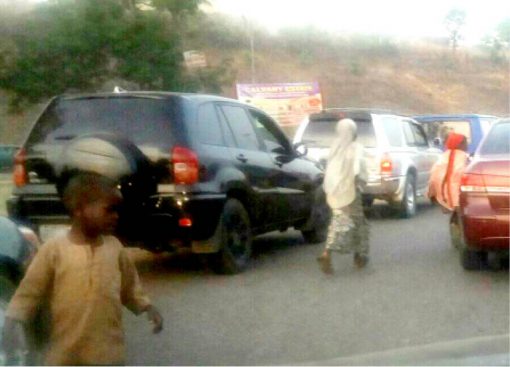“Aunty, God bless you. Aunty help me. Aunty please nah; aunty for food,” says Hannatu (not real name).
These were too common lines chanted by Hannatu as she followed me and other commuters standing by Karu bridge, waiting to board a taxi into Abuja city centre.
She is about 11 years old and is usually seen with other children who are much younger than her around the bridge every day going from one commuter to another begging for alms.
Hannatu is one of 11 million out-of-school children in Nigeria, according to the most recent survey of the National Bureau of Statistics (NBS).
At Karu bridge and other public spaces, including markets and shopping malls, children often chant the same refrain as that of Hannatu which they have memorised overtime on the streets to make ends meet as they cannot communicate in English language beyond those lines.
Recently, as I was about to board a taxi at the bridge, Hannatu in her usual practice, approached me repeating the lines that have become too common: “Aunty please nah…”
Attempt to start a discussionr on why she wasn’t in school suddenly got her uneasy and she went away with the other children flocking around her.
It was, however, noticed that their mothers were always sitting on the ground not far from where the children moved around begging. They monitor them and waiting for them to bring whatever they were given in alms.
This is in spite of the Universal Basic Education Act 2004 declaration that “Every parent shall ensure that his/her child or ward attends and completes primary school education; and junior secondary school education.”
Nigeria has the highest number of ‘out-of-school’ children and the northern part of the country accounts for about 60 per cent of the number. The increasing number, according to experts, is due to poverty, ignorance and other social cultural issues, thus, many children are flooding onto the streets to beg rather than the classrooms to learn.
Saidu Ibrahim, 12 years old, found around the Government Reserved Area (GRA) of Kano city, is a cleaner in one of the posh homes in the exclusive area. He has not had opportunity to attend formal education- he attended only Qur’anic classes.
With no opportunity for basic education in his Badawa community where only one public primary school exists, he said with his job, he earned around N300 daily.
“I want to become an electrical engineer in future, fixing heavy power faults, but my father said I have to finish Quranic school before thinking of going for any formal education,” he said.
However, while experts in the education sector have warned that Nigeria is only in waiting to harvest a crop of destruction if actions are not taken, they have suggested that government and parents need to ensure children are enrolled into school.
The United Nations Children’s Fund (UNICEF) has also decried the rate of increase of out-of-school children across the country with a huge chunk of them in northern Nigeria.
The Communication Specialist of UNICEF Geoffrey Njoku who spoke on this issue at a recent media dialogue, joined other voices for urgent actions to reduce the alarming figures.
“Without focusing on the most deprived, Nigeria will continue to have bad indicators because of inequity,” Njoku noted.
At a media dialogue on access to education held in Kano recently, the organisation called for massive actions from stakeholders and governments in ensuring that school age children are given equal access to be educated.

 Join Daily Trust WhatsApp Community For Quick Access To News and Happenings Around You.
Join Daily Trust WhatsApp Community For Quick Access To News and Happenings Around You.


